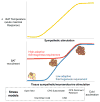The Dichotomous Effect of Chronic Stress on Obesity
- PMID: 27162125
- PMCID: PMC4912918
- DOI: 10.1016/j.tem.2016.04.007
The Dichotomous Effect of Chronic Stress on Obesity
Abstract
Obesity and metabolic diseases are linked to chronic stress and low socioeconomic status. The mechanistic link between stress and obesity has not been clarified, partly due to the inherent complexity exemplified by the bidirectional effect of stress on eating and body weight. Recent studies focusing on adaptive thermogenesis and brown adipose tissue (BAT) function support a dichotomous relation to explain the impact of stress on obesity: stress promotes obesity in the presence of hyperphagia and unchanged BAT function; stress results in weight loss and/or obesity resistance in the presence of hypophagia, or when hyperphagia is associated with BAT recruitment and enhanced thermogenesis. Mechanistically dissecting the bidirectional effects of stress on metabolic outcomes might open new avenues for innovative pharmacotherapies for the treatment of obesity-associated diseases.
Keywords: hypothalamus-pituitary-adrenocortical axis; purinergic; social stress; sympathetic nervous system; β-adrenergic receptors.
Copyright © 2016 Elsevier Ltd. All rights reserved.
Figures


Similar articles
-
The cardiovascular toll of stress.Lancet. 2007 Sep 22;370(9592):1089-100. doi: 10.1016/S0140-6736(07)61305-1. Lancet. 2007. PMID: 17822755 Review.
-
Stress hormones: physiological stress and regulation of metabolism.Curr Opin Pharmacol. 2009 Dec;9(6):787-93. doi: 10.1016/j.coph.2009.08.007. Epub 2009 Sep 14. Curr Opin Pharmacol. 2009. PMID: 19758844 Review.
-
A hypercaloric load induces thermogenesis but inhibits stress responses in the SNS and HPA system.Am J Physiol. 1997 Mar;272(3 Pt 2):R840-8. doi: 10.1152/ajpregu.1997.272.3.R840. Am J Physiol. 1997. PMID: 9087645
-
Effects of Acute Stress on Thrombosis.Semin Thromb Hemost. 2018 Oct;44(7):662-668. doi: 10.1055/s-0038-1660853. Epub 2018 Jun 18. Semin Thromb Hemost. 2018. PMID: 29913534 Review.
-
Chronic stress associated with hypercaloric diet changes the hippocampal BDNF levels in male Wistar rats.Neuropeptides. 2015 Jun;51:75-81. doi: 10.1016/j.npep.2015.01.002. Epub 2015 Feb 12. Neuropeptides. 2015. PMID: 25963531
Cited by
-
A Longitudinal Study of Life Trauma, Chronic Stress and Body Mass Index on Weight Gain over a 2-Year Period.Behav Med. 2022 Jul-Sep;48(3):162-170. doi: 10.1080/08964289.2020.1780192. Epub 2020 Jun 17. Behav Med. 2022. PMID: 32552603 Free PMC article.
-
Dietary Habits and Lifestyle, Including Cardiovascular Risk among Vegetarians and Omnivores during the COVID-19 Pandemic in the Polish Population.Nutrients. 2023 Jan 14;15(2):442. doi: 10.3390/nu15020442. Nutrients. 2023. PMID: 36678313 Free PMC article.
-
Psychosocial stress and central adiposity: A Brazilian study with a representative sample of the public health system users.PLoS One. 2018 Jul 31;13(7):e0197699. doi: 10.1371/journal.pone.0197699. eCollection 2018. PLoS One. 2018. PMID: 30063700 Free PMC article.
-
Optogenetic-induced sympathetic neuromodulation of brown adipose tissue thermogenesis.FASEB J. 2020 Feb;34(2):2765-2773. doi: 10.1096/fj.201901361RR. Epub 2019 Dec 23. FASEB J. 2020. PMID: 31908033 Free PMC article.
-
Chronic Isolation Stress Affects Central Neuroendocrine Signaling Leading to a Metabolically Active Microenvironment in a Mouse Model of Breast Cancer.Front Behav Neurosci. 2021 Jul 9;15:660738. doi: 10.3389/fnbeh.2021.660738. eCollection 2021. Front Behav Neurosci. 2021. PMID: 34305544 Free PMC article.
References
-
- GBD 2013 Risk Factors Collaborators. Global, regional, and national comparative risk assessment of 79 behavioural, environmental and occupational, and metabolic risks or clusters of risks in 188 countries, 1990–2013: a systematic analysis for the Global Burden of Disease Study 2013. Lancet. 2015;386(10010):2287–323. - PMC - PubMed
-
- Whiteford HA, et al. Global burden of disease attributable to mental and substance use disorders: findings from the Global Burden of Disease Study 2010. Lancet. 2013;382(9904):1575–86. - PubMed
-
- Koolhaas JM, et al. Stress revisited: a critical evaluation of the stress concept. Neurosc Biobehav Rev. 2011;35(5):1291–1301. - PubMed
-
- Oliver G, Wardle J. Perceived effects of stress on food choice. Physiol Behav. 1999;66(3):511–515. - PubMed
Publication types
MeSH terms
Grants and funding
LinkOut - more resources
Full Text Sources
Other Literature Sources
Medical

